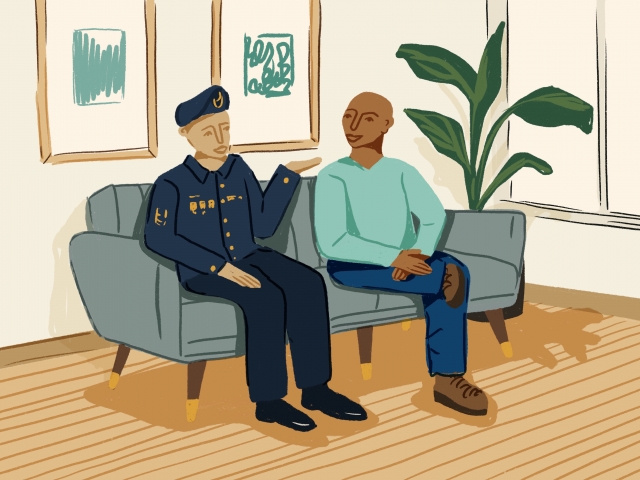Happiness
Episode 58: What Does It Take to Really Listen to Someone?

ERIK ONTIVEROS For me, part of my PTSD was a little bit of like a survivor’s guilt. A little bit of survivor’s guilt, but also a lot of shame. And so a lot of it I wasn’t too proud of and a lot of it carried with me. I came into to be a new father. When when I came home at that time: between the end of ‘09 and beginning of ‘10 is when my daughter was born. And so seeing her really kind of brought a lot of that guilt, not feeling worthy of it. So a lot of self-worth was in question. Self-esteem was in question. And so, yeah, I just didn’t feel like I belonged or I was deserving.
I had to surrender myself and that was hard, because again, the mentality of, you have to ask for help or anything of that nature––you seem vulnerable or you were weak. So when I was going to see my social worker over in Menlo Park. I finally told the truth. And one of the best responses that she could have given me was, “Well, thank you for being honest. And it was about time that you did.” She knew, but she wasn’t going to say anything. And it was just me having to admit that. At that time, it was a big blow to my pride.
DACHER KELTNER After 10 years in the Marines, Erik Ontiveros came home to a new baby and a life as a stay-at-home dad. But his three deployments to Iraq led to PTSD and years of alcohol abuse, until he asked for help.
Today Erik works for the VA helping other veterans get support throughout underserved communities in California.
We asked Erik to choose a research-backed practice to boost happiness, kindness, and connection in his life, and he joins us in studio today to tell us how it went.
Erik, thanks so much for taking the time to be with us on The Science of Happiness.
ERIK ONTIVEROS Thank you, Dacher. I appreciate it.
DACHER KELTNER So we asked you to choose a practice to increase happiness in your own life and you picked one called Active Listening.
For this exercise, you’re supposed to find a quiet place and have a conversation with somebody where you really listen to what they’re saying.
Then you try to follow a list of Active Listening tips from our Greater Good in Action website. Like paraphrasing what the other person is saying; showing you’re engaged by making eye contact and smiling; asking open questions to encourage them to elaborate, and really showing empathy.
When they’re done talking, you’re then welcome to ask if it’s okay to share your perspective.
So who did you do the practice with?
ERIK ONTIVEROS I actually did it, well I tried to do it with both girls, both my daughters.
DACHER KELTNER With your daughters!
ERIK ONTIVEROS With my daughters, yes.
DACHER KELTNER How old are they?
ERIK ONTIVEROS So nine and six. Yeah.
DACHER KELTNER How’d that go? Especially that…
ERIK ONTIVEROS The nine year old caught on. Basically she tapped out and she walked out. But the six year old loves it. She loves it when I do role plays and she’s all about it.
DACHER KELTNER So what specifically did you do? Were they coming back from school?
ERIK ONTIVEROS Yeah, exactly. It was right after school. And so kind of like, how is your day going? And so what the six year old, my six year old in particular today,
DACHER KELTNER What’s her name?
ERIK ONTIVEROS Her name is Emma and she’s very imaginative, very creative.And so, again, her stories and everything else is very elaborate, very detailed. But it’s also three stories in one. Yeah. So in, like, one breath, she can tell you three different types of scenarios. The paraphrasing is very important. “So what I hear you saying is this.” And so it kind of keeps her on track of how she wants to deliver her story or how she wants her message to be heard.
DACHER KELTNER Why do you think your youngest daughter really enjoyed doing this active listening practice with you?
ERIK ONTIVEROS You know, I think it’s because of the one-on-one engagement. The nine year old has been with me through a lot of my counseling sessions. So she knows the talks that I hear with that she hears with my therapist. You know, when I’m having my one-on-ones. So she’s very familiar with the language. So the second I’m starting to pick start doing some of these things, she’s like she picks it up real quick and she’s like, why are you talking to me like that? It’s like…
DACHER KELTNER “I’m not in your office, dad!”
ERIK ONTIVEROS Exactly. Exactly. So kinda rolls her eyes and kind of does her own thing. It’s like, “Alright, fine! Daddy won’t talk to you then!”
DACHER KELTNER Did you do this with some of your veterans that you’re working?
ERIK ONTIVEROS Yeah, actually.
ERIK ONTIVEROS I have a Wednesday group in Menlo Park, and one of the discussions that we were kind of, what is it you would like to do moving forward? So a lot of discussions were kind of focused around self-worth. You know, one veteran was kind of sharing the struggles of, you know, not being able to be with his son at this time. The son relaying to his mom that he hopes his dad gets better while he’s here in the program. And so, you know, a lot of, “I need to, I need to complete this program because I need to be better for him, if not than I am, I’m validating my own thoughts of being a crappy dad.” When he was talking about, for example, the father, their self-worth of being a good father. You know, you’re letting him know that this is what you’re saying. But here is what he’s saying. Your son is saying how much he hopes for you to get better because he wants you to be there. And the other part of the shame was this was like his second go into the program. The last time he was in the program, he was in the program during his son’s birthday. And I was like, “Your son is wishing and hoping the best for you, t you’re going to be home for his birthday this year. You’re not going to be away. You’re going to be there with him. And for him. And that’s all he wants now.” You’re validating, you’re bringing empathy. It does shine light. It does how we say challenge our negative thinking. And you know, I easily could have said, “Well, this is what you should do, this how you can engage, is how you can talk to your wife next time or this how you can, you know, encourage your son or, you know, let them know that things will be okay.” That’s not my position. It’s to validate his thoughts and his feelings.
DACHER KELTNER And I’m really curious, Eric, what your thoughts are about, kind of, working with young veterans back. And what do you think the real magic is?
ERIK ONTIVEROS The real magic is having somebody in that position that can listen, can understand without judgment. And that’s a lot of times what we’re seeking. Yeah. And a lot of the feedback sometimes with the other veterans of their frustrations as when somebody says share something like, I “I know what you mean.” And it could be like with the Vietnam veterans, where a 60-year-old has shared himself, then a young 20, 30-year-olds like, “I know what you mean.” “Oh, really? I didn’t know you were in Vietnam,” kind of response. And I’m sure it’s all within great means. Yeah. But it’s just sometimes the delivery kind of misses the mark. And so when you’re able to kind of sympathize or give actual true empathy, it does make it that much more relatable and an ease to kind of find comfort when you’re talking with another person.
DACHER KELTNER Yeah. So who was tougher, working with the veterans or your daughters?
ERIK ONTIVEROS Well, it’s always easy working with the veterans.It’s way tougher talking with my daughters. So…
DACHER KELTNER You got the teen years coming, Erik!
ERIK ONTIVEROS I made the joke that the six, the six year old is going on 16. And the nine year old’s already going on 21. So yeah, I’m already there.
DACHER KELTNER Wait till you stop giving judgment and advice for the teenagers. They’ll catch you right away! Yeah. You’re already done.
Well, I want to thank you for trying the active listening practice both with veterans and then these these spirited daughters that you have and I’m just curious, what what did you notice about the similarities and differences and in just doing this hard work of listening well with those two groups?
ERIK ONTIVEROS Paraphrasing, it really allows them to kind of know that you’re being engaged. I think I can highlight that enough.
DACHER KELTNER Why do you think paraphrasing is so important when your really trying to listen to somebody else speak?
ERIK ONTIVEROS You know, you’re trying to hear what the other person is trying to kind of put out there and then you responding back of what, “Right. So what I hear you saying is…” Or, you know, anything of clarification. Yeah. Allows them to know that. Yes, they are listening. So again, it is working both. Listening, and hearing. Yeah. that’s something for myself I struggled a lot with, you know, because again, me being programmed a certain way to kind of just react following orders. Follow instructions. Yeah. Do as you’re told. Here’s your mission. You gotta do it. Go do it. No questions asked. Adapt and overcome in a sense, but you never were to clarify, you never were allowed to ask questions.
And that was something, even now with all my relationships, with my parents or whoever is really kind of taking the time to kind of understand. Yeah. You know, when you can do that, it definitely helps build the relationship, whether it be friendship, intimacy, significant other partnership, a family, whoever, this is a great tool to kind of make it stronger.
DACHER KELTNER Yeah, nothing better than feeling understood.
ERIK ONTIVEROS Exactly. Exactly.
DACHER KELTNER Besides paraphrasing, what other steps of the Active Listening exercise do you find really helpful?
ERIK ONTIVEROS The ‘engage with the body language.’ So a lot of times it can be the posture of how a person is sitting or, you know, what they maybe do what their hands or how they continuously look. Often it’s the distance or you have, we have that statue, “David,” look kind of thing where he’s just off to the right, and look, and gaze off into the sunset. And I think that’s where you can express the empathy of recognizing the body language is, “I see that something’s on your mind. Is there something that’s being triggered or being activated?” So again, you can kind of reel them back in. Yeah. So there’s your fish line. And if if there’s any fishers on this listening, you throw your cast out to kind of get the bite. Yeah. And nine out 10 times. Yeah. Yeah they are. And so but it’s like, “Well there is something I’m thinking about. I just don’t know how to say it. Like just. Just share whatever it is that’s on your mind. You know, just put it out there. We’ll decipher it together.” So again, the body definitely tells a lot, lot more than what obviously we’re telling. Some is asking you, “Hey, how you doing?” It’s like I’m a game as that whole shrug and smirking is like, yeah, you’re not okay. So powerful. Yeah. Avoiding judgment of any given advice.
DACHER KELTNER Those are tough!
ERIK ONTIVEROS Those are very tough. Absolutely. So it’s not so much of how it’s making you feel or why is it you’re feeling this way, but more so to, if this situation came up, or if drinking is an issue. How would it be beneficial for you if you had a supporter, right. Or if you had a point contact or if you made plans. Yeah, you know, so now it’s making them think about, okay, you’re not judging, you’re not given advice, but you’re throwing those, you’re posing those questions out to plant the seed for them to think about their own actions.
DACHER KELTNER Giving them perspective on things.
ERIK ONTIVEROS Exactly. And that kind of falls into the last one. You know, after the person talks and have done the above steps, ask if it’s okay to share your perspective. You know, give it different perspectives of things. But at the same time, you know, used in the eyes statements, as it says, you know, I feel overwhelmed when you don’t help out around the house.
“I” statements are great. At the same time, when you do give a perspective, you’re giving your point of view. But like, “I hear what it is that you’re saying. And I see how it is making you feel angry, depressed, sad, lonely, unworthy. This is what I’ve done in those situations. This is how in this situation scenario made me feel this way in this sense. And this is what I was able to do, to kind of help get myself out of that funk.” You know, so again, perspective is definitely, you know, great.
DACHER KELTNER I wanted to thank you for the essential work that you’re doing out there. It’s as important as anything we can be doing. And I want to thank you for being on our show.
ERIK ONTIVEROS Thank you. I appreciate that.
DACHER KELTNER So if you’ve ever seen a therapist, then a lot of the steps of the Active Listening practice might sound familiar to you. But the question is, where’s the evidence that this works outside of a therapist’s office?
GRAHAM BODIE We set out to look at the degree to which that active listening paradigm, which is pretty popular in the counselling literature, if a similar set of behaviors might be beneficial for individuals talking about everyday stressors.
DACHER KELTNER More on the research behind the Active Listening practice, up next.
MIDLINE
DACHER KELTNER Often times we don’t listen to understand, we listen to reply. Active Listening helps us change our mindsets towards one that’s trying to understand someone else’s perspective, as opposed to being focused on getting our point across or being right.
GRAHAM BODIEWe’re trying to recognize that listening is not a passive behavior. It’s not something that you do automatically.
DACHER KELTNER Graham Bodie is a professor of integrated marketing communication at the University of Mississippi.
GRAHAM BODIE It helps to distinguish listening from hearing, for instance, whereas hearing is that physiological automatic response. That’s something that you do all the time, even when you’re asleep. Listening, on the other hand, is what happens after those sound waves have penetrated the eardrum and your brain starts to process some of the information that you’re hearing in your environment.
In a simple nutshell, active listening is basically just a term that we might use to remind everyone that listening isn’t as easy as we’ve been told our whole lives. And it isn’t something that we do naturally or even well, most of the time.
DACHER KELTNER Graham’s team brought undergrads from Louisiana State University into a “listening lab” and assigned one group to talk about their problem, and the other to listen to someone else talking about their problem.
GRAHAM BODIE In some of these conversations you have to strangers to people who haven’t met each other before, one of whom is talking about a stressful experience and the other one who has no training and active listening or any other kind of listening, who is acting as they normally would when a friend has a stressor.
DACHER KELTNER They also brought in graduate students who were finishing up their final year of a counselling education program.
GRAHAM BODIE And we told them, you know, we want you to operate in your active listening counsellor, you know, format.
DACHER KELTNER They video-taped all of the conversations, both with the students were trained in Active Listening, and those who were not.
And then they measured how much people were smiling, making eye contact, nodding their heads…And then they also looked at verbal cues like paraphrasing and asking open questions.
GRAHAM BODIE So questions that allow the speaker to explore multiple options, usually beginning with a “W, H.” Like, “Who, why, when and what,” versus a closed question, which is things that generate answers, usually yes or no.
DACHER KELTNER The results showed that when people engaged in Active Listening behaviors, the person talking about their problem felt that the listener was more emotionally aware. They also reported feeling better after their conversation.
Graham’s team found that it was the verbal cues, things like paraphrasing and expressing empathy, that were the most helpful.
GRAHAM BODIE The verbal behaviors on average are about three times more important than the contribution of the nonverbal behaviors on average. The verbal behaviors basically are more important determinants for disclosures to both feel better about the event as well as feel better about the listener.
Although nonverbals would get you part of the way there, if you’re not actually contributing to the conversation, then you’re not enacting the role of what they expect from a quote unquote, “good” or a “competent” listener. And so what you say becomes important to that person’s well-being over time. And that’s what that study suggests, that helping them work through those emotions and again and helping them elaborate on why they feel the way they feel. That’s really the key to helping people work through difficult events.
DACHER KELTNER If you’d like to try Active Listening yourself, visit our Greater Good in Action website at ggia.berkeley.edu. Tell us how it went, or share other thoughts, by emailing us at greater at berkeley dot edu, or using the hashtag “Happiness Pod.”
I’m Dacher Kelnter, thanks for joining us on The Science of Happiness. Our podcast is a co-production of UC Berkeley’s Greater Good Science Center and PRX. Our senior producer is Shuka Kalantari. Production assistance is from Jennie Cataldo and Ben Manilla of BMP Audio. Our associate producers are Brett Simpson and Ariella Markowitz. Our executive producer is Jane Park. Our editor-in-chief is Jason Marsh. Special thanks to UC Berkeley’s Graduate School of Journalism.





